by Jenny Rose | Mar 1, 2018 | A Flourishing Woman, Creativity
Alchemy: A seemingly magical process of transformation, creation, or combination (online Oxford Dictionaries).

The Star
Emotional intelligence training opened my eyes to the power of needs in our human experience. Coming to terms with my own needs catapulted me into a new life. During the months in which I learned to navigate through my feelings, needs (click here for needs inventories), limiting beliefs and stories, I kept coming back around to the same question.
If I accept that all human beings have needs, and a right to have them met, what then do I do with my unmet needs, past and present?
We might all have a right to get our needs met, but that doesn’t mean we have a guarantee they will be met, or that we can hold anyone responsible for meeting them. We can meet some of our own needs, but not every one. Some needs require healthy connections with others, but not everyone has that. Some people don’t have a single healthy connection with another human being, let alone many, and one relationship can’t meet all our needs.
Unmet needs are devastating, make no mistake. They drive addiction, all kinds of violence and power-over behavior (like school shootings), mental and physical disease and illness, and suicide. A chronically unmet need is a nonhealing, stinking ulcer on the soul. We may hide it from others and even ourselves, but it never stops oozing blood and pus. Unmet needs can cripple and/or kill us. We can let go of some people, behavior and beliefs, but needs are intrinsic.
None of us can entirely meet another’s needs. We all have limitations of some kind, and finite resources of time and energy. Being unable to meet another’s needs is not necessarily because we’re unloving or uncaring. Most of our close relationships probably do meet some of our needs some of the time, and we meet some of their needs some of the time. It’s not black or white. It’s a continuum, a balance of reciprocity.
So, I ask again, what about our needs that just don’t get met because even our healthy connections are unable to fill them?
At that point we make choices. We can choose to:
- Act out in some desperate, destructive or deadly way that hurts ourselves or others.
- Blame the people around us for failing to meet our needs.
- Blame ourselves for having needs and feeling the pain of having them unmet.
- Deny that we need anything from anyone — ever (my personal favorite).
- Figure out how to neutralize the experience of unmet needs.
By neutralize, I mean accept and surrender to how painful it is to carry around a bone-deep, persistent longing for something that’s unavailable.
Acting out has never been my style. I’m also not much interested in blaming others for what goes wrong in my life. It feels like a cop-out and it disempowers me. Blaming myself — now that I’m very good at. I’ve spent years perfecting the art of self-loathing, but it’s never been helpful. Not even one time. Besides that, it hurts. I can’t pull off denial, at least not for long. I might refuse to admit certain things to someone else, but I don’t play games like that in the privacy of my own head. I have a file in my documents labeled ‘Denial File.’ Now and then I put something in that file and leave it there while I wrestle with my unwillingness to believe. When I’m ready to stop arguing with what is, I take it out and re-file it. Usually, the Denial File is empty, but I like knowing it’s there for the really tough information.
That brings me to the last choice, which leaves me standing squarely in my power. I don’t hurt myself, I don’t hurt anyone else and I get to think outside of the box — my favorite thing! What kind of alchemy transforms, creates or combines an unmet need into something beautiful?
For several months I’ve been researching outer space for my second book. I’ve compiled lists of constellations and the mythology around them. I have definitions of meteors, comets and nebulae. I’ve spent hours looking at images from space. Astounding, mysterious, vast and lovely, the universe is infinitely larger than the largest playing field I can imagine. I gulp down science fiction books and I’ve watched hours and days and weeks of Star Trek, Stargate, Battlestar Galactica, Firefly and yes, yes, Star Wars!
I also, fairly frequently, turn up The Star card when I work with my Tarot deck. The Star symbolizes creative powers, confidence and diversity.
So, what if I create a cosmos? Great word, cosmos. It means “the universe seen as a well-ordered whole” (online Oxford Dictionaries). I’m always in favor of well-ordered, especially when I get to define it. All the pieces of my experience, including unmet needs, are part of a whole. I prefer combination and integration to amputation.

Photo by NASA on Unsplash
Here I am, with my unmet needs, my history, the people who have been significant in my life and a lot of passionate feelings to express and process. I’m an alchemist, a creator, and before me is a vast black nothingness.
I want stars in my cosmos, so every tear I’ve ever cried becomes a star. I fling them far and wide, like handfuls of tiny crystals. My cosmos is so vast there’s always room for more.
I want planets in my cosmos. I hang them carefully, one by one. These are the people in my life, past and present, living and dead. Some are hot planets, sere and lifeless. Others are cool and green and blue. Every cosmos needs a bloviating, bullying gas giant with heavy gravity that sucks more than its fair share of, well, everything! Rings are decorative, and spots and alien seas and strangely-shaped continents. Also, sand dunes and storms, poisonous (to us) gases, radiation, erupting volcanoes, mountain ranges and glaciers.

Photo by NASA on Unsplash
How about moons? Cool and sterile or lush and verdant; I definitely want moons. I want constellations, too, and stories to go with them. Blazing meteors and trailing comets add movement. Nebulae add color and mystery. Galaxies swirl and spiral or spill like ribbons of milk against the darkness. Black holes suck. Suns supernova.
One by one, I use my unmet needs to decorate my cosmos. I turn them into color, texture, pattern, alien world, moon, star, sun, comet, meteor and nebula. I name them, animate them with feeling, polish them like jewels and set them in place. Maybe they stay in the farthest reaches of my cosmos, where I rarely visit them, or maybe I keep them closer. Perhaps my unmet needs appear from time to time in a meteor shower or a comet with a long tail, and I marvel at their beauty and mystery and remember again their taste and feel before they burn away to ash or disappear behind a planet.

Photo by Bryan Goff on Unsplash
My cosmos is my laboratory and my kitchen, illuminated by starlight. I stir and simmer over the heat of suns; chop and mix under waxing and waning moons; grind alien insects, rocks and roots for pigment and infuse gas and cosmic dust with color. I orbit, I dance from galaxy to galaxy in bare feet, combine a pinch of this with a handful of that until I float, weightless and free, in a cosmos of my own design and decoration.
Whenever the world is too much with me and I find myself staggering under burdens of unmet needs and other things I cannot release, I unlock a hidden door with the key I carry between my breasts and find star candles lit, suns asimmer, planets revolving and black holes lurking. Mortar and pestle, cauldron and crucible wait for my magical offerings as I combine, create and transform the material of my life into a complex and resplendent whole.
Alchemy. My daily crime.

Photo by Bryan Goff on Unsplash
All content on this site ©2018
Jennifer Rose
except where otherwise noted
by Jenny Rose | Feb 22, 2018 | Choice, Power
A small clay sculpture of a woman with her hands cupped in front of her chest sits on my desk. She holds a tiny clay bird and is surrounded by a couple of crystals, a piece of amethyst and a small geode. This little altar has been my daily companion for years. Wise and smiling, round and nurturing, the sculpture has comforted me through many losses, grief and rage. She’s one of my greatest treasures.
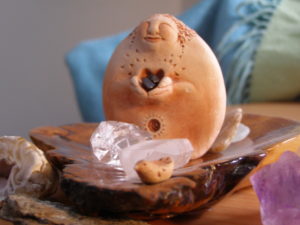
Letting Go
These days, the bird she holds is perched on the rim of the wooden dish she sits on, looking out at the room, at the world, at me. It can stay, or it can fly away. For now, it’s content to sit, watching and listening, as I live my life in these two small rooms at the top of our sagging farmhouse.
I have placed tiny polished garnets in the woman’s cupped hands where the bird once nestled.
I had a friend, dear and wise, in my old place who once said to me if we open our hands and let something go, and keep our hands open, something new will come and fill them. As she spoke, I again saw the image of an open hand, generous, allowing freedom, and prepared to welcome and support the next thing, and the next.
Letting go is power. Letting go is serenity. Letting go is an authentic act of love toward self and others. The usefulness of letting go is not a secret. Almost any self-help book out there talks about it as an aspect of healthy functioning, but I think popular psychology doesn’t explore it deeply enough.
Letting go doesn’t mean we brush aside our feelings. Not at all. Unexpressed feelings cement us in place. We all know people who remain frozen in time because of a death or traumatic event. Years and decades pass, but they don’t heal. They don’t move on. Their emotional growth is arrested. This is what unfinished emotional business looks like. Unexpressed feelings can’t flow through us and dissipate so we can release them.
We know very little about appropriately expressing our feelings in this culture.
Feelings aren’t thoughts. They’re not stories, expectations, beliefs or ideology. They’re not labels or rules. Like it or not, admit it or not, we’re physiologically wired for feelings, and they give us good information about how things are with us. Our thoughts and beliefs, on the other hand, are frequently distorted, confused, misinformed, outdated or otherwise unreliable.
That’s where letting go comes in.
We’ve all had events in our life that left deep scars. We’ve all seen things we can’t unsee, heard things we can’t unhear and done things we can’t undo. We’ve all felt disempowered or victimized at one time or another. Death and disaster enter our lives with no warning and take those we love.
Some people move on from such events with more grace than others. I suspect part of that grace has to do with forgiveness. Not forgetfulness, but forgiveness of self and others. I suspect another part is the ability to fully experience and express the feelings attached to the event. That requires a certain kind of support, and many folks don’t have it. Some people simply don’t choose to move on or let go. They center their thoughts, feelings and energy in the event, whatever it was, and they hold it tight, cherishing it, feeding the fire of their pain, keeping their scars open with the razor blade of their attention and focus. It becomes part of their identity, part of their story, a grievance to cling to, a betrayal to treasure, a wound to worship.

Photo by Andrey Grinkevich on Unsplash
I have a book called Clean Sweep, by Denny Sargent. It’s filled with rituals and instructions to help us let go of what no longer serves us. The author outlines a banishing exercise in which he suggests the reader visualize holding tightly to a thorny branch. In my own version, the branch is heavy, so heavy I can hardly hold it, which drives the thorns deeply into my flesh. The branch is a person, event, memory or belief that gives us emotional pain. We can make an easy choice and cling to it, cradle it, embrace it, let it tear our skin and make us bleed. We can make a harder choice and set it down, open our hands and let it fall. We can walk away from it. We can burn it or bury it.
In order to let go, we have to be willing to surrender control and endure loss. Letting go of a core piece of identity, a long-held belief or a painful memory is difficult work, even when that core piece, belief or memory gives us great pain. Letting go will leave a hole. Then what? Then who are we? How do we fill that hole? How do we understand ourselves and our place in the world? This is scary stuff.
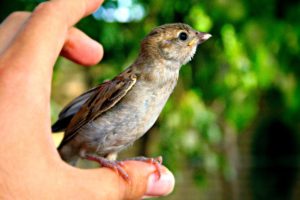
Photo by a-shuhani on Unsplash
Aristotle said nature abhors a vacuum. My friend was right. If we open our hand and release what we’re holding, something else will come, though we can’t predict or control what it might be. In fact, the thing released might return to us in another form. We can’t know. We’ll never know unless we release our need to control. We’ll never find out what might perch on our open hand if we’re not willing to walk through loss in order to reach gain.
I’m having a long and involved break up with my desire to control. Some days I go all day without thinking about it, and other days I want to micromanage everyone and everything in my life. Some days I feel light and free, a confident and lovely woman, and other days I feel like a grubby three-year-old hiding under the covers sucking my thumb because nothing and no one is the way I want them to be. I sulk and pout and snarl and I feel crushed by the thorny weight of my need to control.
Then, at some point, my eye falls on my little clay wise woman and her cupped hands and wide-open heart, and I say, “Oh, yeah. That’s right. Letting go.”
I feel annoyed when people tell me to “get over it.” First of all, I have a right to my feelings, and secondly, it’s not that easy. Letting go, for me, is a practice, and I need time to engage in it. Sometimes I go back and find my leaden armful of hawthorn or bramble or locust and hold it again for a while, opening up all the old wounds, exhausting myself, hurting myself, and, finally, opening my hands and letting it fall again. Sometimes I need to design a ritual for letting go, a prayer or a dance or some kind of purification rite. Sometimes I need to make a physical resting place, like a grave or a patch of garden or a newly-planted tree in order to let something go. For me, taking time to honor whatever it is I’m trying to release is helpful. Whatever it is that no longer serves, it was once a part of my life and experience. Laying things to rest in this way helps me release them fully and finally.
When it comes right down to it, this blog has been an exercise in letting go as much as anything else.
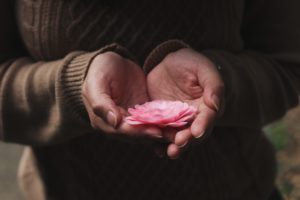
Photo by Ester Marie Doysabas on Unsplash
When we know how to let go, we increase our power, as well as the power of others. Often, what we desperately hold onto is people. This is a strong archetype in old stories; locking the beautiful maiden in the stone tower to “protect” her. Part of love, as any seasoned parent will tell you, is letting go. Imprisoning, disempowering and trying to control others isn’t love. Refusing to let go of someone isn’t love.
Releasing our grievances with others frees them as well as ourselves. Being willing to accept an apology, an explanation, and the imperfections of others allows us all to move forward with lighter loads. The stories and memories we hurt ourselves with are often ghosts, events involving people who are long dead and far in the past. We can choose to bless them and lay them to rest.
I don’t want to haul around painful memories, toxic garbage, the futility of trying to control life and ineffective behaviors and beliefs. I can’t swim with all that tied to my ankle. I can’t dance. I can’t embrace anything or anyone with an armful of brambles. I can’t create with a heart full of thorns.
I want to be free.
I open my hands.

Photo by Stephen Leonardi on Unsplash
Make a Boat
Make a boat
out of who you are
not what you have.
If you don’t know who you are
(Search for the desert between the worlds.
Find Bone Mother.
Recollect.
Reassemble.
Bathe in soul.
Birth yourself.)
That is another journey.
Your boat will be small.
You can take no one.
You can take no thing.
Shape your boat with your truth.
Shape it with the joy in your hands
and the wisdom in the soles of your feet.
Make a chisel of rage and grief.
Sand with the grit of clarity.
Stain with blood.
Oil your boat with the moisture and musk of your sex.
Stitch the rags of your life into a sail.
Weave rope from your hair.
Take your time
And remember
Fear does not float.
When you know the boat is ready,
Sit in it.
Lay the backs of your hands on your knees.
Open your hands.
Let everything go.
Let everything go.
Keep your hands open
So that new things may come.
Without fear
Ask the one who stands just behind your shoulder
The one who shelters your life in the shadow of her wing
To come forward.
She will guide the boat.
Surrender yourself to your boat,
to the water,
to your guide.
Find your breath.
Stay there.
Find your heartbeat.
Stay there.
Keep your hands open.
Rest.
Don’t stand up in the boat!
Don’t throw yourself out of the boat!
Don’t you want to see where you are going?
Look. See how the feathers on her wing
trail in the water?
All content on this site ©2018
Jennifer Rose
except where otherwise noted
by Jenny Rose | Nov 16, 2017 | Connection & Community, Emotional Intelligence, Shadows
I recently had a conversation in which I learned about the degree to which my anxiety affected at least one of my now adult children.
Parenting is an ironic business. Having been a chronically anxious child myself, always feeling unsafe and afraid, I strove mightily to protect my own children from any sort of fear or insecurity. Of course, I did this by assuring them all was well, all the while fearing all was not and never would be well. Being no less intelligent than I am, they heard the words but knew the truth of my feelings, and thus their trust in me was damaged, an exact replay of what happened between me and my own mother. You know, that thing I was never going to do when I was a parent!
Well, I’m humbled. I’m also sad, because I didn’t want either of my kids to battle with the burden of anxiety. It’s a hard way to live.
However, I understand parenting, at best, is an imperfect process, and I try to hold my mother and myself with gentle arms regarding our choices as mothers. Parenting less than perfectly does not imply a lack of love. I know we both did the best we could with what we had at any particular point in time. No parent can do more.

Photo by Liane Metzler on Unsplash
Still, this kind of revelation is a far cry from my hopes, dreams and intentions when I held my newborns. On the other hand, it speaks to the strength of my relationship with my adult children that they can tell me the truth about their experience and I can hear it.
After our conversation, I’ve thought a lot about fear and anxiety. I can’t go back and reparent, but I wonder if I might, even at this late stage, find a way to extricate myself from the insidious tentacles of anxiety. I’ve been thinking about my life and trying to understand exactly what the roots of my anxiety are.
According to an Internet search, fear is “an unpleasant emotion caused by the belief that someone or something is dangerous, likely to cause pain, or a threat.” Fear is considered real, in that it’s right there in front of us, and elicits an immediate response.
Anxiety is an “emotion characterized by an unpleasant state of turmoil; a feeling of worry, nervousness or unease, typically regarding an imminent event or something with uncertain outcome; a nervous disorder.” Anxiety is differentiated from fear by being more diffuse and generalized and focusing on imaginary outcomes and possibilities. Physiologically, it elicits the same response, and therein lies part of the problem.
Both are unpleasant emotions or feelings affecting us physically, intellectually and emotionally. We evolved to respond to fear in certain specific physiological ways, returning to baseline as the fear passes. Fear is a valuable feeling, helping us discern and avoid danger. I certainly don’t want to disable mine. I know the feeling of fear, but it’s not a frequent experience.

Photo by Stefano Pollio on Unsplash
Anxiety, on the other hand, is a chronic state for me. I can’t remember ever being free of it. I’ve developed a lot of coping mechanisms over the years, some more effective and appropriate than others, but I can’t imagine what life would be like without it. As far as I can tell, the feeling of anxiety provides no benefits whatsoever to me or anyone around me. It’s highly contagious and negatively impacts others in my life, to say nothing of the damage it does to me. We are not constructed to tolerate the chronic level of physiological arousal produced by anxiety.
I never before actually looked up these words, and I’ve never had the above distinctions between fear and anxiety until this week. I conclude that I have no problem with my relationship to fear, but I’m a slave to anxiety.
I find a kind of mordant humor in having a chronic unpleasant feeling regarding uncertain outcomes. Excuse me? All outcomes are uncertain for everyone until they happen! Most of us operate most of the time as though we know exactly what will happen next, but we don’t. I’ve lived long enough to know that’s all an illusion. Nobody knows what’s going to happen next on any level. For some reason, I’ve given that fact the power to make me miserable.
I have a powerful imagination, which makes me a good writer and creator. However, it also occasionally makes me captive to my own stories. I forget that my stories are just that — stories. I make them up, tell them to myself over and over, and behave as though they’re true, never really noticing when they diverge from reality. In my head, it’s all so real. I do know the difference between a story and what’s real, but I have to remind myself to keep the two separated.
Some stories are so old and deeply ingrained it takes a cataclysm to make us realize they’re not true, and then we have to deal with being wrong and all the consequences, an uncomfortable, humbling and messy process.
If my anxiety is rooted in uncertain and imaginary outcomes and possibilities, it seems obvious I can disable it with a little discipline, a dash of surrender to uncertainty, a lot of presence and the will to change. I’m chagrined by the possibility my anxiety is a lifelong bad habit as much as anything else. Could that be true? Yikes.
I wish with all my heart I’d been a better equipped and less distressed parent, but I remind myself I can’t go back. I can’t begin parenting again from ground zero. I can’t go back to the young woman I was and explain all this and give her the support and safety to actively choose to turn away from anxiety before starting a family. There’s only today, so many years later, as I sit with my laptop in my lap and the sun coming in the windows, glancing at my notes, thinking and writing.
I know all I’ve ever wanted for my own mother is health and happiness. I want the same for my kids. I suspect Mom and my sons also want that for me. Perhaps it’s time for me to shape an anxiety-free life now, not only for my own sake, but for those closest to me as well.
We build our lives on outcomes, one after another, more than we ever notice. We remember the spectacularly good and spectacularly bad outcomes, but what about the countless others? Outcomes are complex, not black and white. Outcomes can create visible and invisible ripples that last a lifetime. I can hardly think of a more fruitless endeavor than worrying about or trying to control outcomes. I’ve survived every outcome to date. What makes me think I won’t continue to do so — until I don’t, of course? But the outcome of death is largely out of my control, too. Why worry?
There are so many things I’d rather do than struggle with anxiety!
There are so many stories to imagine, share and write, rather than keep in my head and hurt myself with!
Anxiety is too expensive. I’m not interested in maintaining it anymore.
Better late than never. My daily crime.

Photo by Senjuti Kundu on Unsplash
All content on this site ©2017
Jennifer Rose
except where otherwise noted
by Jenny Rose | Sep 21, 2017 | Connection & Community, Emotional Intelligence, Holistic Management
Middle age is great fun. I’m constantly amused at how much time I spent during the first half of my life being ineffective. I’ve had heartfelt intentions, goals and plans and I’ve worked hard, but I’ve never understood a thing about simply letting life be. I know all about discipline and almost nothing about surrendering to the natural flow of anything, including myself.

Photo by Ester Marie Doysabas on Unsplash
A few months ago I read an article about what makes plants happy. It was a revelation.
I call myself a gardener. During some periods I grew most of my own vegetables and herbs. It was a lot of work. In Colorado, water was always a problem, and in my rural gardens deer were a constant threat. Keeping a garden weeded, mulched and watered, along with raising two little boys, working, and running a household on a shoestring, was quite a challenge. I thought I knew a lot about gardening.
Here in Maine I don’t garden. We don’t have dedicated garden space protected from the deer, for one thing. For another, my diet has changed and I mostly eat meat now. I’m also older, my knees complain bitterly if I spend a lot of time kneeling, and my body does not want to bend over in a garden every day.
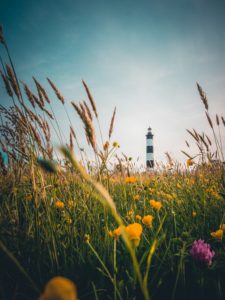
Photo by Louis Maniquet on Unsplash
On the other hand, we probably have thirty or more apple trees, wild raspberries (red and black), wild strawberries, highbush cranberries, blueberries, elderberries, roses, an ancient and persistent grapevine of unknown variety, sugar maples, pear trees and nut trees spread out across our land. The whole place is a garden.
We also have a short hedge of beach roses, thickly thorned and tough, running right along the road on the east side of the house. It gets the snowplow drifts of snow, ice and sand in the winter and the heat, exhaust and sometimes trash of every passing vehicle in the summer. I couldn’t kill them with an axe. It’s not a tall hedge, but it blooms pink in the spring and provides a small barrier between the house and the traffic. In this season it’s loaded with fat red round rose hips.
In the spring, we saw a lot of dead wood in the rose hedge and we began to give it a heavy pruning. It had been neglected for years, and I was certain it would come back, thicker and healthier than ever. It was miserable to work on because the thorns, though short, are numerous and tough, and defy the heaviest work gloves. We got about halfway through the task and then Spring caught us up, along with many other projects, and we never finished pruning the hedge. I raked up what we did take out, pitched the debris over a bank so the thorns were out of the way, and did nothing else for it. The denuded hedge looked spiky and ugly until it leafed out.
In the ensuing months I’ve watched that hedge bloom as usual with its bright pink flowers. One day I saw wild buttercup was also blooming in the places we’d pruned. Wild violets crept around the edges. Yellow hawkweed moved in. After the buttercups came white and yellow daisies. Then a froth of Queen Anne’s Lace draped around it, and tall purple clover beckoned the wild bees. As those faded, I recognized goldenrod and wild asters beginning to grow. Every couple of weeks my partner mows between the hedge and the house. That’s the only care and attention it ever gets.
Wildflowers have bloomed, each in their season, mingling with the roses, all summer and fall. Now there’s a foam of purple and white wild aster and the roses are blooming for a second time, mingling with hips. The hedge is a riot of color.
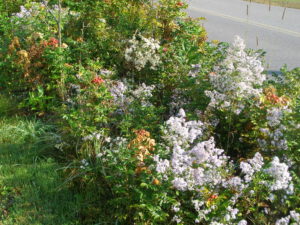
Beach rose hedge 09/17
This takes me back to the article I mentioned about what makes plants happy.
The article points out that plants grow in the wild according to their evolution, needs and contribution in a system. Some plants are tall and grow in isolation. Others are immensely social and form clumps or swathes. Some plants like to creep along the ground and grow low. Others are quite high and grow with tall grasses because they need the support of the surrounding stems. Look at a natural meadow or field in summer that hasn’t been grazed or recently mown, and you’ll see a system of plants and grasses growing together with no input from humans. There are no bare places that need to be mulched. Nobody comes along and dead heads and tidies things up. As flowers fade and plants die, or are fed on, vegetable matter and seeds fall to the ground and become food or sprout into the next generation of plants. The meadow or field, if healthy, will have a full complement of insects, birds and small rodents present, and so on, up the food chain.
Okay, you get the picture. Biology 101, right? But that’s not a garden.
A garden is where we prepare the ground by banishing “weeds;” amend, dig and turn the soil by exposing it and sterilizing it and wearing out our backs; spend money protecting the area with fences, animal repellents, insecticides and herbicides; buy bags and bags of expensive manure, peat, top soil and mulching materials; spend more money buying plants, often without particular regard to whether they’re native to our area and with no idea or interest in how they grow in the wild; and plant them in solitary confinement, carefully spacing them out in sad little oases amid the mulch. We do not give them appropriate companions or communities, allow them to build a family around themselves or allow them to make the contributions they were evolved to make to other plants and wildlife.
We hold gardens to our own standards of neatness, cleanliness, obedience and beauty. We cut and tidy away brown leaves and spent blossoms lest they offend the eye, never imagining we’re depriving our plants of the free food they were evolved to need. We plant to please our color and variety preferences, never asking ourselves or bothering to find out what those particular plants need in order to be happy. We never imagine ourselves a shrew, or a chipmunk, or a grasshopper, and it doesn’t occur to us to lie on the ground with our chins in the dirt and appreciate the complex layers of plant life covering it. The only view we consider is the one from above, and the only layer we see from that vantage point is the top one.
That’s what we call a garden. Isn’t it beautiful?
We humans have an incorrigible, idiotic kind of blind arrogance, myself included. I confess I never once thought about observing how Nature gardens and modeling my gardens on hers. Not once. Yet Earth has survived for millions of years, creating rich, self-sustaining forests, swamps, grasslands and other habitats without the interference of human beings. We don’t think about the plants’ point of view, though. We come along, wear out our bodies, spend money, try to reinvent elegant and sustainable life systems and wonder why gardens don’t thrive.
Duh.
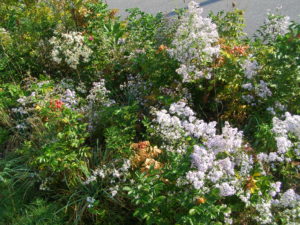
Beach rose hedge 09/17
I’ve been thinking about this article about what makes plants happy for months, and watching our little rose hedge. As we move into fall, I spend a certain amount of time pruning away dead wood and crowded saplings in many different places. We’ve cut a couple of old and dangerous trees. As I work, I carefully lay all the debris at the base of the plants I’m working on. I don’t uproot things. I don’t disturb the soil or the layer of wet rotting leaves on the forest floor. I cherish the sight of mushrooms growing everywhere, because I know they signal a healthy mycelium net underground, serving every plant and tree on the place and beyond. Apples and berries fall and rot where they lay, sinking back into the ever-richer earth. I notice how the wildflowers grow and spread and who they grow and bloom with. I’m making friends with the low ground-covering plants: Wild chamomile, wild strawberry, white clover, wild basil with its purple flowers, the sweet little violets and rabbit’s foot clover.
Unless in our way, we let trees lie as they fall and rot over time. We run the mower over autumn leaves and let them lie. We carefully stake volunteer or rodent-planted saplings to avoid mowing them, so the next generation of black walnut, maple, oak and beech can grow. We leave the tent caterpillars alone, because they provide food for birds, bears and other creatures.
I realize now all my neat gardening was driven by perfectionism, by a desire to feel in control, and by a need to please the eye of myself and others. I invested a lot of sweat equity in trying to garden “right” without ever questioning what that really meant. I made it much, much harder and more expensive than it ever needed to be.
It’s worth noting this is exactly the way I treat myself.
The rose hedge reanimated itself. It grows in the most inhospitable area of the whole place, but it knew just what to do. I stood back, let it alone and marveled.
You know what? I take it back. I’m not a gardener. But I do humbly enjoy a 26-acre garden.
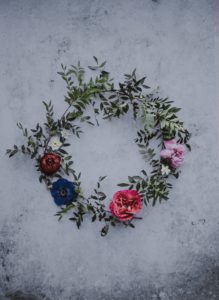
Photo by Annie Spratt on Unsplash
All content on this site ©2017
Jennifer Rose
except where otherwise noted
by Jenny Rose | Sep 14, 2017 | Connection & Community, Emotional Intelligence, Shadows
Power lies beneath the layers at the center, the heart, the core. All avenues of thought, all paths of inquiry lead back to power. What is it? Who controls it? How do we manage and maintain it? Power is the fuel of life. Every relationship is rooted in power. Managing our power is the key to managing our lives at every level, physical, emotional, creative, sexual, spiritual and intellectual.
Narcissists stalk emotional power. They seek it, they lust for it, their voracious hunger and need drive them to control it. They are a yawning abyss that can never be filled because they lack the ability to generate their own emotional power. They will never cease hunting for prey.

Photo by Rain Wu on Unsplash
The prey of the narcissist is carefully addicted and programmed with romance, charisma, and sex into becoming emotional power machines, set and calibrated to take full advantage of finely-gauged specifications of the prey’s need and vulnerability, so as to provide an unending stream of high-quality emotional power on which the narcissist gorges at will: The fine wine of our love, the exotic spices of our passion, the honey of our confusion, the refreshing tang of our jealousy, the nectar of our anguish and the bitter dark chocolate of our despair. Eagerly, we spread our longings, hopes, fears and fantasies before the icy coruscating mirror concealing the narcissist’s true nature. Narcissists manufacture networks of emotional power machines and pit us against one another in order to obtain ever more abundant, complex and complicated fuel. We are not released until we malfunction, and then we’re contemptuously eliminated (but not freed) to make room for a shiny new machine, and we languish until called for again.

Photo by Gary Bendig on Unsplash
The only hope of escape and healing lies in power, the center, the heart, the core beneath the layers. We must cease to hoard, deny, silence, or give away our emotional power. We must claim it, excavate it, call it by name, learn the flavor and scent of it. We must weep with it, rage with it, release it in righteous orgasm, create with it, fight with it. We must look through its unclouded eyes and follow it, wherever it takes us. We must pray with it, surrender to it and adore it. We must soar within its rapturous fiery wings and plunge into its healing green water. We must build a cosmos out of our emotional power and fill it with galaxies, adorn it with jeweled planets and sow it with shooting stars.
We must defend our emotional power with our lives, for without it we cannot live. We must seduce and enchant ourselves with the rapture of our own emotional power so we cannot be captivated by the scintillating mirrored eyes of the narcissist, for if we’re captured by those mirrors we’ll find nothing but our enslavement and performance as emotional power machines reflected back to us, and the stench of the charnel house will invade our souls.

Photo by Aimee Vogelsang on Unsplash
We must look in those glittering mirror eyes, look deeply, look well, and say, “Ah, here is my own reflection, my ravishing emotional self, entirely naked and unashamed.” We must say, “No, I will not be your emotional power machine, no, you can give me nothing that wasn’t already mine, no, I name you Narcissist and I know your terrible secret: You are powerless without your prey,” and turn away, dance away with our bountiful bared breasts and strong hips, pressing our lips to our own shoulders with love because we have everything we need, everything we want, as we embrace our own emotional power beneath the layers in our center, in our heart, in our core.
For more information on recognizing, understanding and managing narcissists and their behaviors, explore narcsite dot com, created and written by a narcissist. If you suspect you have had or now have a narcissist in your life, read ‘The Prime Aims’ on that site for clarification. If you are now or have been entangled with a narcissist, seek help and support immediately if you have not already done so. Your life is at risk.
All content on this site ©2017
Jennifer Rose
except where otherwise noted



















